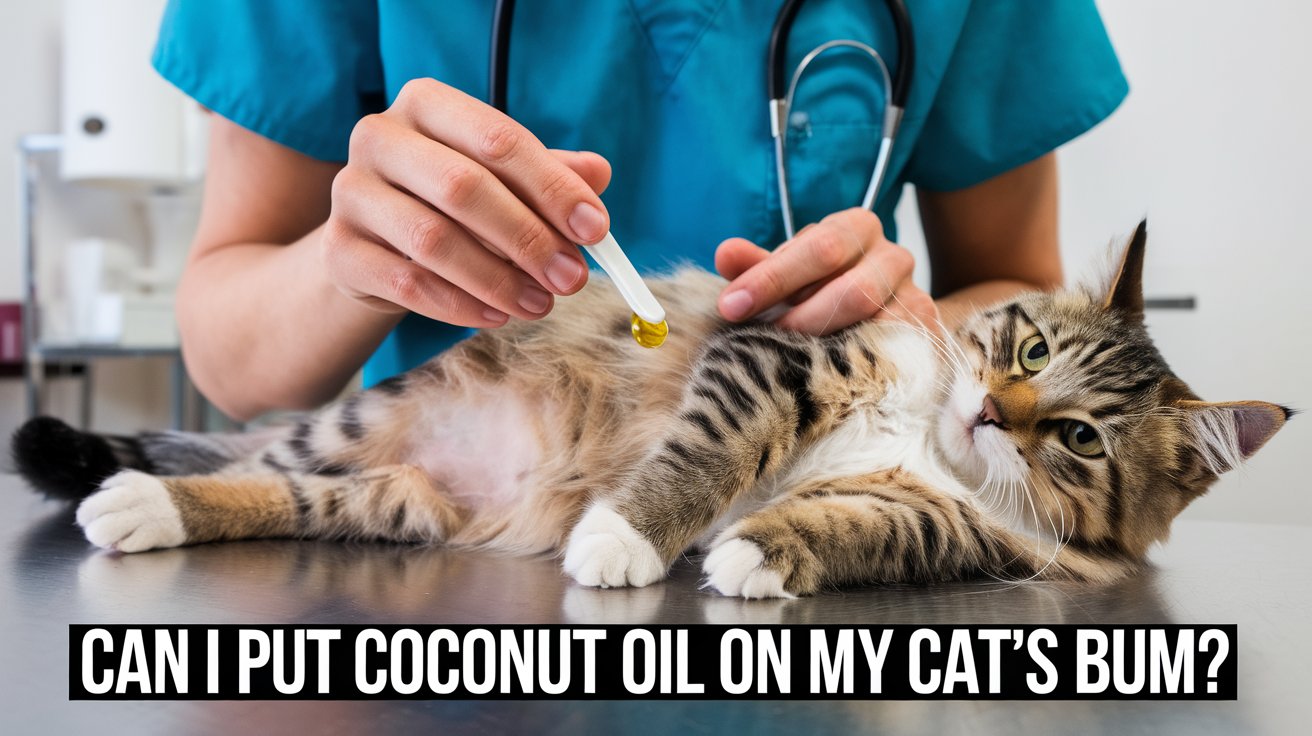
Table of Contents
ToggleCan I Put Coconut Oil on My Cat’s Bum?
Coconut oil has become a popular household item, often praised for its versatility and health benefits. From cooking to skincare, many people have found various uses for this natural oil. But when it comes to pets, particularly cats, questions arise about its safety and efficacy. One common query that pet owners have is, Can I put coconut oil on my cat’s bum? In this article, we’ll explore this question in detail, covering everything you need to know about using coconut oil on your feline friend.
Understanding Coconut Oil
Coconut oil is derived from the meat of coconuts and is rich in saturated fats, particularly lauric acid. These components give it its unique properties, making it useful in various health and wellness applications. For pets, coconut oil is often touted as a natural remedy for skin issues, and digestive health, and even as a supplement to improve coat condition.
Why Would You Use Coconut Oil on Your Cat’s Bum?
There are several reasons why you might consider applying coconut oil to your cat’s bum. One of the most common is to address issues like irritation or dryness. Cats can sometimes experience discomfort in this area due to various factors, such as allergies, infections, or even grooming habits. Coconut oil, with its moisturizing and anti-inflammatory properties, might provide relief.
Another reason might be to treat minor wounds or infections. Coconut oil is known for its antibacterial and antifungal properties, which could help in healing minor cuts or preventing infections. However, it’s essential to understand when coconut oil is appropriate and when it’s not.
Is Coconut Oil Safe for Cats?
Generally, coconut oil is considered safe for cats when used in moderation. Many pet owners have successfully used it to treat skin issues or to improve their pet’s coat. Yet, there are some risks to consider. Coconut oil is high in fat, and if ingested in large quantities, it could lead to weight gain or digestive issues like diarrhea.
Additionally, some cats might be allergic to coconut oil. It’s crucial to monitor your cat for any adverse reactions after the initial application. If your cat shows signs of discomfort, swelling, or excessive grooming of the area, it’s best to discontinue use and consult your vet.

How to Properly Apply Coconut Oil on Your Cat
If you’ve decided that coconut oil is the right choice for your cat’s bum, it’s important to apply it correctly. Here’s a simple step-by-step guide:
- Clean the Area: Before applying coconut oil, ensure the area is clean and dry. You can use a soft cloth dampened with warm water to gently wipe the area.
- Use a Small Amount: A little goes a long way with coconut oil. Start with a small amount, about the size of a pea, and warm it between your fingers.
- Gently Apply: Gently massage the oil onto your cat’s bum, focusing on the affected area. Be sure to avoid applying too much pressure, as it may cause discomfort.
- Monitor Your Cat: After application, watch your cat closely for any signs of irritation or discomfort. It’s normal for your cat to groom the area, but excessive licking might indicate a problem.
- Repeat as Necessary: Depending on the issue, you might need to reapply the coconut oil once or twice a day. Always monitor your cat’s reaction and adjust the frequency as needed.
When Should You Avoid Using Coconut Oil?
While coconut oil can be beneficial, there are situations where its use might not be advisable. For example, if your cat has a known allergy to coconut oil, it’s best to avoid it altogether. Additionally, if your cat’s bum is severely inflamed, bleeding, or has open wounds, coconut oil may not be the best treatment option. In such cases, it’s crucial to consult with a veterinarian for a proper diagnosis and treatment plan.
Benefits of Coconut Oil for Cats
Coconut oil offers several benefits for cats beyond just treating their bum. Here are a few:
- Skin and Coat Health: Coconut oil can help moisturize dry skin and add shine to your cat’s coat. Regular use may prevent flakiness and itching.
- Anti-inflammatory Properties: The lauric acid in coconut oil has anti-inflammatory effects, which can help reduce swelling and discomfort in irritated areas.
- Antibacterial and Antifungal Benefits: Coconut oil’s natural antibacterial and antifungal properties can help prevent infections and promote healing of minor cuts and abrasions.
Common Misconceptions About Coconut Oil and Cats
There are a few myths surrounding the use of coconut oil on cats. One common misconception is that coconut oil is a cure-all for any skin issue. While it has its benefits, it’s not a substitute for veterinary care, especially in cases of severe infections or chronic skin conditions. Another myth is that it can be used in unlimited quantities. As mentioned earlier, too much coconut oil can lead to digestive issues and weight gain.
Alternatives to Coconut Oil for Cats
If coconut oil isn’t the right choice for your cat, there are other natural remedies you can consider:
- Olive Oil: Like coconut oil, olive oil is moisturizing and can be used on your cat’s skin. It’s also rich in antioxidants.
- Aloe Vera: Aloe vera gel can soothe irritated skin and has cooling properties. However, ensure it’s free of harmful additives and chemicals.
- Vitamin E Oil: This oil is known for its skin-healing properties and can be applied to minor wounds and dry patches.

Potential Side Effects of Coconut Oil on Cats
While coconut oil is generally safe, it’s essential to be aware of potential side effects:
- Allergic Reactions: Some cats might develop an allergy to coconut oil, leading to redness, itching, or swelling.
- Digestive Issues: Coconut oil can cause diarrhea or vomiting if ingested in large amounts.
- Weight Gain: Due to its high-fat content, regular use of coconut oil might contribute to weight gain in some cats.
Additional Tips for Cat Care
Beyond using coconut oil, maintaining your cat’s overall health is key. Regular grooming, a balanced diet, and routine vet visits can prevent many issues before they start. Always watch your cat’s behavior and physical condition, and don’t hesitate to seek professional advice when needed.
FAQs About Coconut Oil for Cats
- Can coconut oil help with hairballs?
- Yes, coconut oil can help reduce hairballs by improving the passage of fur through the digestive system.
- Is coconut oil safe for cats to ingest?
- In small amounts, coconut oil is generally safe for cats to ingest. However, it should be given in moderation to avoid digestive issues.
- Can coconut oil be used for other parts of the cat’s body?
- Yes, coconut oil can be applied to dry skin, minor wounds, and even paws to keep them moisturized.
- How often should coconut oil be applied?
- The frequency of application depends on the issue being treated. For minor skin issues, once or twice a day is usually sufficient.
- What should I do if my cat reacts negatively to coconut oil?
- If your cat shows signs of an allergic reaction or discomfort, discontinue use immediately and consult your veterinarian.

Conclusion: Can I Put Coconut Oil on My Cats Bum?
Coconut oil can be a helpful and natural remedy for minor skin issues on your cat’s bum. Its moisturizing, anti-inflammatory, and antibacterial properties make it a versatile tool in pet care. However, it’s crucial to use it correctly and be mindful of your cat’s reactions. Always consult your veterinarian before introducing new treatments to ensure the best care for your furry friend.

I am a dedicated writer and expert in cats, with years of experience studying feline behavior, health, and breeds. Passionate about sharing my knowledge, I provide valuable insights and practical advice to help cat lovers understand and care for their furry companions. When not writing, I enjoy spending time with my beloved cats, continually learning and deepening my expertise.

Leave a Reply